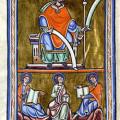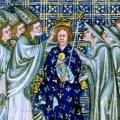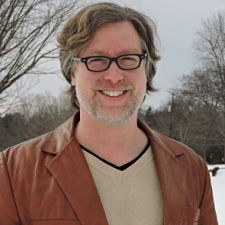217. Andrew Arlig on Parts and Wholes
Andrew Arlig joins Peter to discuss medieval discussions of mereology (the study of parts and wholes).
Themes:
• A. Arlig, “Some Twelfth-century Reflections on Mereological Essentialism,” Oxford Studies in Medieval Philosophy 1 (2013), 83-112.
• A. Arlig, “Parts, Wholes, and Identity,” in J. Marenbon (ed.), The Oxford Handbook of Medieval Philosophy Oxford: 2012), 445-67.
• A. Arlig, “Peter Abelard on Material Constitution.” Archiv für Geschichte der Philosophie. 94 (2012), 119-46.
• A. Arlig, “Is There a Medieval Mereology?” in M. Cameron and J. Marenbon (eds), Methods and Methodologies: Aristotelian Logic East and West, 500-1500 (Leiden: 2011), 161-89.
• A. Arlig, “The Metaphysics of Individuals in the Opuscula Sacra,” in J. Marenbon (ed.), The Cambridge Companion to Boethius (Cambridge: 2009), 129-54.
• A. Arlig, “Abelard's Assault on Everyday Objects.” American Catholic Philosophical Quarterly 81 (2007). 209-27.
• A. Arlig, Medieval Philosophy: a Contemporary Introduction (London: 2023).







Comments
Goethe
For German lovers only, some lines of Goethe's Faust:
Wer will was Lebendigs erkennen und beschreiben,
sucht erst den Geist herauszutreiben,
dann hat er die Teile in seiner Hand,
fehlt, leider, nur das geistige Band.
Encheiresin naturae nennt's die Chemie,
spottet ihrer selbst und weiß nicht wie.
For Encheiresin naturae see this Wikipedia article: http://de.wikipedia.org/wiki/Jacob_Reinbold_Spielmann
Parts and Podcasts
So the History of Philosophy Podcast is a whole made up of individual podcasts. If the forces of Darkness destroyed all trace of one individual podcast, say Episode 217 Andrew Arlig on Parts and Wholes, we would not want to say that the History of Philosophy Podcast is no longer the History of Philosophy Podcast, would we? Or would we? Consider this, the History of Philosophy Podcast is known also by its handle WITHOUT ANY GAPS, and between episodes 216 and 218 there is a glaring gap. It seems to follow that the substance of the podcast as it was is no more! It's dependent upon its parts to form an integrated whole (is that how 'integrated whole' is supposed to be used?)!
What distinction can stop this metaphysical trainwreck? The peoples of the world search in vain for a podcast on mereology to help them with the problem.
The Ghost of Arlig appears saying, "Fear not Novices, The species History of Philosophy podcast is not dependent upon the continued existence of its parts, for so long as at one time those parts have existed or will exist the The History of Philosophy Podcast retains its metaphysical place in the cosmos."
The people rejoice! But soon realized they are not in an epistemic position to access the destroyed episode...
- I almost got carried away for a second.
I enjoyed that
Thanks so much
Add new comment